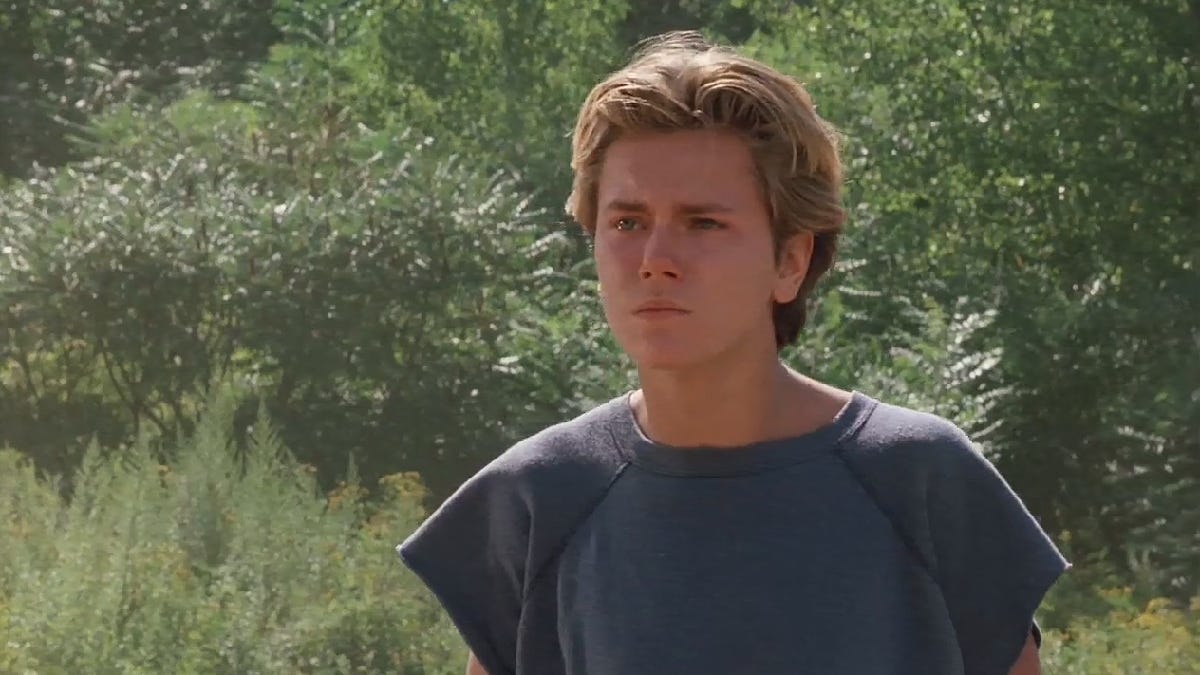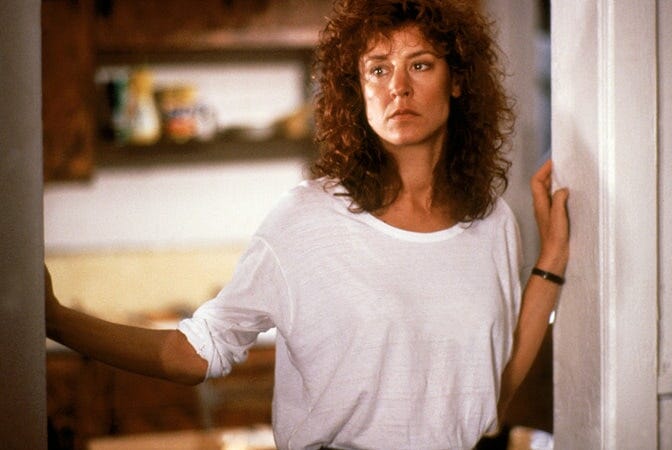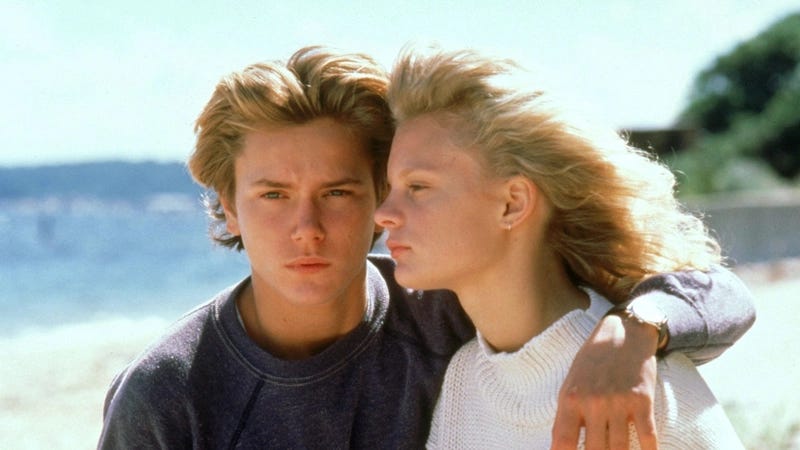The Family Underground: Sidney Lumet's 'Running on Empty'
This heartbreaking drama, one of Lumet's most underrated, weighs the costs of a radical act of conscience.
Two recent movies had me thinking about 1988’s Running on Empty, one of the most overlooked movies of Sidney Lumet’s career and arguably one of the best. The first is the Oscar-winning CODA, which remakes the 2014 French coming-of-age drama La Famille Béiler, but mirrors the central conflict of Lumet’s film so uncannily that it feels like a remake of that, too. Both are about high school music prodigies with the talent to place in top academies—Julliard in one, Berklee College in the other—but a unique and essential responsibility to their families that ties them to home. In CODA, the child is the only hearing member of her family, making her an important link to the community, especially as it pertains to her parents’ struggling fishing business. In Running on Empty, the child has been on the lam since he was a toddler, changing towns and identities due to his parents’ involvement in the anti-war protest bombing of napalm lab that blinded a janitor. There’s much more at stake for everyone than a normal graduate heading off to college in the fall.
The second film is How to Blow Up a Pipeline, a scrappy and genuinely provocative indie film that got some attention in our recent 2023 Subscriber Poll. It’s about a group of young activists who conspire to take the same sort of dramatic action on climate change that their predecessors in organizations like The Weather Underground took on the Vietnam War fifty years earlier. The fallout from the title event doesn’t map onto Running on Empty as neatly as CODA, but it does make you think about how these radical leftists are willing to leverage their futures—if not, their lives—to take a stand, believing that peaceful protest and incremental change is too ineffectual to meet the urgency of the crisis. Where might they be after a long prison sentence? Or how will they live as older adults or even parents if they’re still under watch from federal agents? It’s not something they can consider too deeply at the time, not when the now is so important.
We don’t make this discovery until late in Running on Empty, but Danny Pope (River Phoenix), a gifted pianist in his senior year at a New Jersey high school, has been living as a fugitive from the FBI since he was a two-year-old. His younger brother Harry (Jonas Abry) was born into it. That means Danny’s parents, Annie (Christine Lahti) and Arthur (Judd Hirsch), knew that blowing up the napalm lab would dramatically impact the boy’s life, especially if they were killed or jailed or permanently on the lam. Annie confesses later that she never allowed herself to think about the inevitability of Danny growing up and leaving the nest, and she didn’t think about it, either, when they had Harry. You could call Annie and Arthur selfish, but their emotional needs are understandable: They’ve severed themselves off from their families and homes, so naturally they would want their own unit, however dangerous and transient that lifestyle proves to be.
Working from a script by Naomi Toner—who happens to be mother to Jake and Maggie Gyllenhaal—Lumet added Running on Empty to a run of films, starting with 12 Angry Men and continuing with classics like Serpico and Prince of the City, about the immense burden of acting on conscience. The Popes were inspired loosely by Weather Underground leaders Bill Ayers and Bernardine Dohrn, who were married fugitives in the early ‘70s due to their connection to a few bombings, connections that landed Dohrn on the FBI’s Most Wanted list for a stretch. (The two found themselves back in the news in 2008 as part of an election smear against fellow Hyde Park, Chicago resident Barack Obama, who Sarah Palin accused of “palling around with terrorists.”) Toner’s script imagines the Popes, with the help of an underground network, moving from town to town indefinitely, where they and their sons have to change their identities and locations and be ready to move again at a moment’s notice.
As the film opens, the kids already know the drill. Danny spots a couple of conspicuous vehicles tracking him home and moves quickly to coax his brother out the backdoor and alert his parents, who are ready to drop everything and take off in the van. Even in this small, hurried glimpse of the life they’re leaving behind, Toner and Lumet add lots of telling detail: Arthur working with local activists on nuclear waste issues, Danny escaping with his wooden practice piano, and the family dog getting abandoned in a parking lot for someone else to claim. That last part is particularly painful to think about. The Popes are compassionate people, but they’ve had to train themselves not to forge connections with anyone (or anything) outside the unit. It makes them closer, but their insularity can feel suffocating.
Danny has the breezy, peaceful, living-in-the-moment vibe you’d expect of a teenager raised by hippies, but the Popes’ new life in New Jersey exerts a pull on him that he doesn’t expect. His music teacher (Ed Crowley) immediately recognizes him as the most talented student he’s ever had and presses him to audition for Julliard, which would involve getting his nonexistent school records in place. He also gets romantic attention from the teacher’s daughter, Lorna (Martha Plimpton) and falls in love against his better instincts. It may be unfair for Danny to be anchored by a radical action his parents decided to take when he was two-years-old, but one of the touching aspects of Running on Empty is that he doesn’t seem to resent them for it. He loves them enough to absorb the pain of sacrifices that were beyond his discretion.
Running on Empty is a reminder, as if we even needed one, of how much the film world lost when Phoenix died of an overdose in 1993. The sensitivity he brings to key scenes in the film, reflected through eyes that are both attentive and melancholy, is heartbreaking without reaching for melodramatic effect. Take your pick of beautiful scenes here: Danny turning down sex with Lorna because he knows the relationship can’t last and then later confessing everything because he loves her too much; Danny finding out his grandmother’s identity and delivering a pizza to her doorstep just to get a moment with her; Danny quietly sliding left on his piano bench when his mother, a former prodigy herself, joins him in a duet. Phoenix is an open book here, modeling the kind of tender masculinity that we see more often now in actors like Timothée Chalamet, but has often been vanishingly rare in American movies. His Danny is the type of kid who enrolls in a home economics class with all girls and doesn’t think anything of it.
Though Danny is the focus of the story, Lumet and Foner have a great feel for Arthur and Annie’s marriage, which is full of tensions and complications that could never be resolved by separation, divorce, or even couples counseling. They’re tied together indefinitely, which for Annie means tolerating her husband’s mood swings, controlling nature, and occasional bouts of drinking. Lahti is particularly affecting as a once-free spirit who not only sacrificed her musical talent to activism but also her sense of self; over the years, she has become the conventional middle-class wife that she’d had to pretend to be. In the film’s most moving scene—and this one requires an entire box of tissues—Annie meets secretly with her father (Steven Hill), a man she once called “an imperialist pig” to ask him to look after Danny. Years of anger, regret, and sadness are exorcized in that one conversation, and it seems likely they’ll never see each other again.
The end of Running on Empty is wrenching in its own way, because it’s too difficult for any conversation to happen like the one between Annie and her father. There’s a practical reason for that, because the Popes are once again running from the law, but Arthur’s brusque words to Danny at the rendezvous spot (“Get the bike out of the back. Now get on it.”) are at once typical of his role as family disciplinarian and all he could probably bring himself to say at that moment. With respect to CODA, a perfectly satisfying melodrama, that family will see each other again when its one hearing member leaves the nest—Berklee College is only an hour’s drive from Gloucester. In the best case, Danny might shake the feds long enough for a phone call or a clandestine exchange, but Arthur is essentially clipping the umbilical cord a second time here. They’ve raised him to be a good person and to make a difference in the world. He’s on his own now.







Adore this film. I don't think the "Fire and Rain" singalong scene ever gets enough love, but definitely feels like a precursor to moments like the Skeleton Twins lip sync, and the callback breaks my heart every time.
Also managed to fall in love with Christine Lahti all over again - having her in Housekeeping beforehand.
I knew this title but had no idea what this movie was about (or even maybe that it was a Lumet film), but this sounds great and extremely up my alley!
Also, for people who are interested in the history of the Weather Underground, Zayd Ayers Dohrn, the son of Bernadine Dorhn and Bill Ayers, did a podcast a couple of years back called Mother Country Radicals where he talks about the movement and also his personal experiences growing up on the lam, essentially. And it is really, really good.